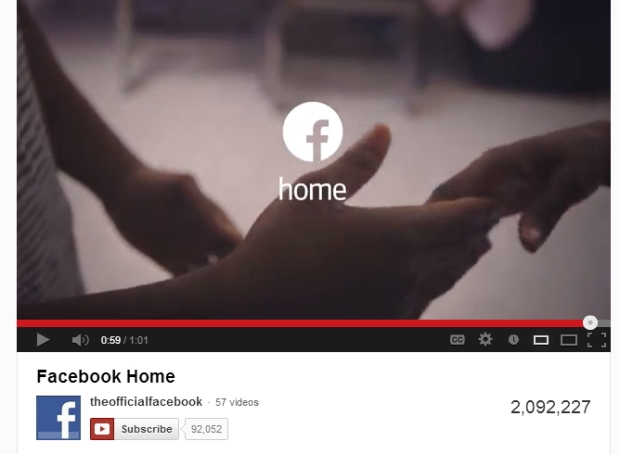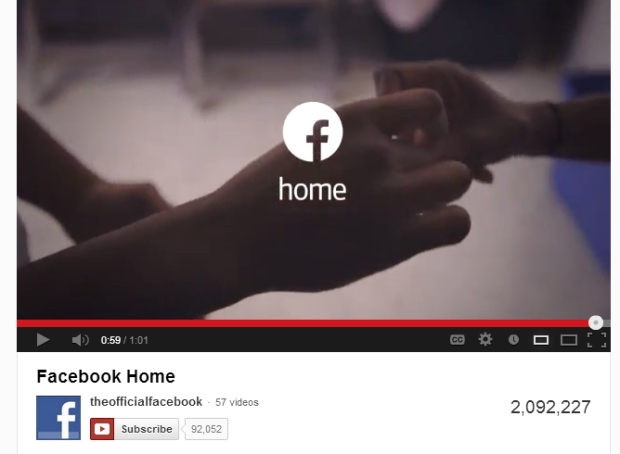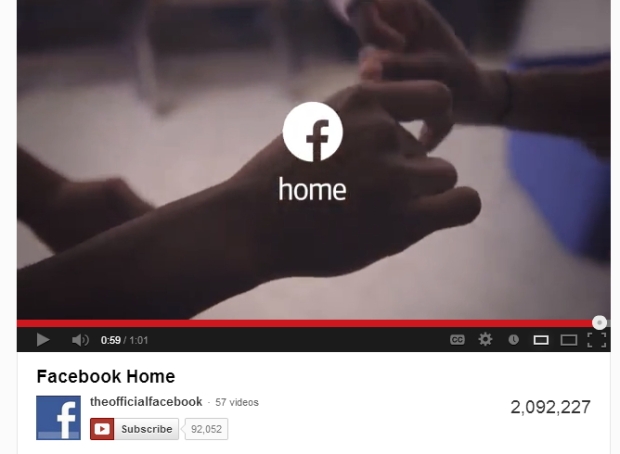Archive for category Local media – TV
Facebook Home Ad – Spot Ghanaian moment
Posted by hollatainment in Ghana, Local media - TV, Social Networking, technology, Uncategorized on April 12, 2013
I was watching the new Facebook Home ad on YouTube and spotted a Ghanaian moment.
You know, the Ghanaian handshake [and snap].
That snap of fingers that makes the Ghanaian handshake unique….was captured accurately in the ad.
I’m wondering who, in Facebook’s creative department or their Ad agency team, pulled this off?
I bet this shot was taken in Ghana!
Of a mad man – Ken Agyapong, a twitter bully and the invisible hand of 2012 election connecting them
Posted by hollatainment in Ghana, Local media - TV, Media, Press, Uncategorized on April 17, 2012
So I am minding my business as a student and thinking of internships and finals and the coming summer break…
..but here I am blogging about Ghana not because I am feeling nostalgic about a Ghanaian Easter/ Christmas and Azonto dance moves and the things that make me proud to be a Ghanaian but contemplating the implications of Ken Agyapong’s ‘declaration of war‘ in response to allegations of minors registering for the upcoming presidential elections in Ghana.
Arrogance, ignorance and money make for a bad combination in a culture where rich people are celebrated and vested with power. To even read that some persons besieged the Ghana Police Headquarters to demand the release of Ken Agyapong beats my wildest imaginations. I wonder if they understood Ken’s call for people to butcher others with machetes? and what misery a war can bring.
Most NPP politicians have decidedly kept quiet or risen to Ken’s defense or try to dampen the severity of his call for war. How can such a graphic call to war involving slashing fellow Ghanaians with machetes be explained away as ‘metaphorical’ and with no bad intentions? Counsel to Ken or no, Atta Akyea just lost all the respect I had for him as an educated gentleman and lawyer.
“All that is necessary for the triumph of evil is that good men do nothing”
I applaud all who have roundly called Ken Agyapong’s outburst for what it is and Ghanaian artistes for their quick response and attempt to use social media to call for peace albeit wrongly targeted. The general populace who listen to Ken’s radio are not your usual twitter/facebook fans. Get your music together and do a peace concert. Throw in some Azonto competition and defuse this Ken Agyapong madness.
In other remotely related happenings on twitter in Ghana:
I will decidedly not mention any twitter handles but I think that some celebs shouldn’t ask some persons to campaign for peace in Ghana. People follow people on twitter for different reasons just as houseflies will settle on pastries and cow dung. Point here is that because someone is popular on twitter for breaking gossip doesn’t mean they have legitimacy to ask people to take socially positive action.
“Adjapong might be right. If only NDC didnt allow Togolese people into the border to register to vote all this wont happen!”
The above is what you get. SMH..
The double-edged sword of technology – case of sexually abused University of Ghana student
Posted by hollatainment in Local media - TV, Press on April 5, 2011
I have been reading a lot of blog posts (DAIXY, Dustyfootgirl, CriticalPoint)and comments about the case of Amina and one thing is clear, most people clearly and unequivocally denounce the actions of the Mensah Sarbah hall students who took the law into their own hands and sexually assaulted a fellow student who they had caught stealing.
What led to this blog post were a couple of comments by (mostly) some men that this case of Amina [sexual assault] is being given too much attention and blown out of proportion. What you find common in their comment is that Amina is getting so much attention because it is a case of a woman, or in some cases saying that same noise would not be made if it was a man who was [sexually] assaulted (by other men or women?).
This argument, I think reflects a general mindset of some men who feel threatened by womens’ rights and pro-feminist [affirmative] actions or a denouncement of any male testosterone-charged acts of folly that in their minds is their privilege.
But this blog post is not about such men who can’t distinguish a condemnation of an ACT as heinous as the one perpetuated from a feminist agenda. This is about the role of technology in the unique context of a sexual assault case caught on tape, shared over the internet and the issues arising.
Technology has played an important role albeit positive and negative.
1. It has given a wider audience an opportunity to see an act so heinous we’re all reeling from the effect of a wanton display of human rights abuse.
2. It has preserved forever a traumatic experience of an individual.
3. It has brought to the fore the human taste for the morbid and also brought out the best of/multiple human emotions including fear, empathy and need for justice.
4. It has helped open an opportunity for mob-justice to be seen and addressed.
I am among the many people who have witnessed ponding, [as I described in my previous post] but like most of you, we have not seen it on YouTube. I can barely recollect the faces or names of the few guys I witnessed going through a ponding session and somehow I am happy for it. Whoever underwent ponding for theft wouldn’t have to relive that experience every time they saw the video somewhere. The internet is like an echo that never ends; an echo that is carried on and on; an echo that is reechoed just when one thinks the sound is dying down. Amina will forever remain in the minds of people because of this video but also she will relive the experience whenever she sees the video reported on the news, mentioned in a conversation or even intimated in a conversation that her ordeal was ever captured on video and probably residing on people’s hard drives and phones.
The human taste for the morbid is a paradox. We feed on tragedy but don’t want to be in them. We have to even exercise restraint to not go back to see this video as is the case of most people [who for bizarre reasons still have the video sitting on their desktops]. As Daixy said in her post, it was scary how fast the video went viral. Would people have recommended the video so fast and with glee if it were something intellectually challenging or even a newly discovered animal or natural phenomenon? I think not!! Some of the comments I saw on twitter and facebook made me wonder if some of those people would have acted any differently from the assaulters of Amina and the possibility that some might have still scares me.
But there are positives that should be highlighted, credit that can be given to technology [not to mention the fool who decided to video it for his private/ viral/ public consumption of mob-justice]. The video can lead to the apprehension of some students (witnesses or perpetrators) and help in investigations that will? (may) ultimately lead to justice for Amina and the correction of a wrong that shouldn’t have happened in the first place, on a university campus of all places.
Technology has brought to light something that most of us would never have had the opportunity to see or to even appreciate the gravity of. That in itself is not a benefit but it definitely serves as a call to action and will forever gnaw at the minds of people in authority till they do something in response that will be measured in the public eye as a commensurate response to the ordeal Amina went through.
Our attitude to mob-justice has been challenged to the core by the video we saw. The campaigners against mob-justice now have a powerful tool to highlight their point. Our own fears of the [remote] possibility of us or someone we know suffering same ordeal has rocked us to the core as it should. In a call for justice for Amina we’re acting on a natural instinct of self-preservation. No one wants to go this way.
I must say that I have not seen the gory details of the whole video [save for the edited version I watched with Graham on TV3] and whiles I can’t get Amina’s look of sheep-caught-in-the-midst-of-wolves out of my mind, I am grateful I know people whose judgment and [emotional] response I can trust. I have seen human empathy at its best, demonstrated through a thorough condemnation and show of disgust at the ill-treatment of Amina through blog posts, radio call-ins and general discussions. Someone told me, ‘please don’t watch the video if you haven’t seen it’; it is that bad and can take one through a rollercoaster of emotions.
In conclusion however, I will want a few persons who think this issue is being given too much attention to think these through. Would they rather this had happened to a man for them to gauge public response? Would they rather physical damage be done to Amina to finally get them to lend their FULL voice to the campaign for justice?
No, I can assure you Amina has been psychologically scarred enough [ and will need all the support the University of Ghana guidance and counseling session can give her.] No, I don’t need to see another video of a human being fending off many hands from different directions in a bid to not drown in the furor of tugging and poking. No, I don’t want to see another person fighting to maintain their personal dignity against a throng that will not give ear to their pleas for mercy.
Amina wasn’t given a chance but technology has now given us a chance to call for justice for Amina; justice that through our indifference towards mob-justice was denied her the moment she was caught in an act of theft. An opportunity to call on the police to get closer to the public, hold citizens’ arrest trainings and other ways to manage thieves. An opportunity to call on the University of Ghana authorities to put policies in place and spearhead a national discourse on [stopping] mob-justice and by so calling these people to action, we will be securing the lives of our friends and loved ones.
A Culture of Insults?
Posted by hollatainment in Local media - TV, troski, trotro, Uncategorized on November 19, 2010
Growing up was fun and sometimes difficult because I couldn’t get away with much. There was no way I could insult a playmate without getting a scolding from a passing adult. There was no way I was going to see or hear an insult on TV or in a movie. There were fewer television programs back then.
I still remember Aku Shika as one of my favourite Ghanaian movies. The movie producers made up for their poor equipment by producing educative, funny and generally better movies. The ever popular Sunday evening Osofo Dadzi was not popular because it was the ‘only’ show but because it remained innovative, comic and stayed true to its moral themes.
This post was inspired by Intimations of Immortality from Recollections of Early Childhood and an observation made by Graham.
Things have definitely changed.
It is not now as it hath been of yore;—
Turn wheresoe’er I may,
By night or day,
The things which I have seen I now can see no more.
Are we slowly descending into a Culture of Insults? I think we are! And I’m not even talking about politicians here. I’m talking about the many insults trotro drivers and taxi drivers hurl at each other and other road users. I am talking about the local Ghanaian language movies that sell for cheap and find their way into our homes and broadcast to our television sets. I am talking about all the insults we are taking in and likely to give back after they have festered and can’t be suppressed any longer.
If there is something I hate about public transportation, it is that trotro drivers and their mates insult just about everyone they encounter in the line of duty.
– How many times haven’t trotro drivers honked at and insulted private drivers who are waiting ahead of them at a traffic light? [moments before the light turns green].
– How many times haven’t trotro drivers overtaken and insulted private drivers who [have made the conscious effort to] respect the speed limit, road signs and the zebra-crossing
– I can’t count the number of times I’ve heard a trotro driver insult a private driver or a pedestrian just for the sake of it; calling a private driver ‘a privileged *insert expletive*’ is so commonplace that some passengers in these buses laugh or throw in their insults for good measure.
I can’t stand insults in Ghanaian movies, especially those that are meant to incite laughter . Why can’t Agya Koo, Judas and Kyewaa say or do something funny or say something witty?
– Casting my mind back to Kwaw Ansah’s Love Brewed in the African Pot, I wonder where all the smart people in the Ghanaian movie industry went. Can’t we simply produce a comic moment that will be as memorable as the closing scene of the #LBitAP any longer? Without resorting to insults?
– Unless I’m wrong, everyone of these movies is supposed to carry a socio-cultural message. You can check their titles or watch how in the end the good always triumphs over the evil, how Ghanaian traditions are upheld and portrayed in all of its splendour. [the typical Ghanaian storyline]. However, what the audience take from these movies are the many insults. The chain of insults can be heard playing on people’s cell phones and the latest of them are actually discussed.
– You find adults laughing when they hear kids throwing these same insults around because they happen to be quoting Agya Koo or Kyewaa. (And before you think that you don’t fall in this category, remember that ‘this category’ happens to be the majority of the Ghanaian population).
Don’t tolerate this creeping phenomenon. Don’t let us stand by while Ghana descends into a culture of insults.
Reproach a kid you see insulting another kid because that is the Ghanaian thing to do. And, remind an adult to watch his/her language [if the circumstances permit] because that is the Ghanaian thing to do.
Ghanaian movies & ‘their’ music videos…
Posted by hollatainment in Local media - TV on October 30, 2010
Artist: Shegee
Song: Shame
I’m sure some of you have seen this song?(music video) or a similar one on Crystal? TV and I’m certain most of you cannot even remember the chorus to the song.
I like innovation, heck, I like (doing) new things…but the NEW!! trend of advertising Ghanaian movies by releasing a music video is a sorry attempt at selling or marketing.
These music videos are poorly written, poorly sang, poorly directed and poorly produced. They simply reek of poor quality and they are flooding our TV sets and wasting our precious family times behind the set.
You know the music video falls within this category when you see these:
1. Unknown artists eg. Sheege
2. Cheesy and poorly sang verses
3. Easily Forgettable Choruses
4. Excerpts of the movie playing in the music video
Bad songs like these do not deserve the attention or airtime they get, no wonder they never make it onto any nomination or awards list.
Methinks these songs do not represent Ghana’s rich musical culture!!
Laugh a Minute – make it a Late Night show
Posted by hollatainment in Local media - TV on October 5, 2010
David Oscar can tell jokes, no doubt and he can do nice mimes to go with them.
I think on the 4th September (yesterday) for the first time on Ghana television (Viasat1), a presenter used “SHIT!” and got the *beep*. Guess who did? David Oscar!!!
After getting his *beep*he flashed his nice set of teeth and I bet it was mischief I saw in his eyes (the kind that goes like ‘Yes I did it, I said SHIT on TV when KSM, Fritz Baffour hadn’t…cool!!’
Back to my point, Late night(10pm/11pm-ish) shows like Jimmy Kimmel’s do not necessarily contain explicit or R-rated content but are so timed because they are still inappropriate for kids.
Now I mentioned KSM and Fritz because they brought satire and live comedy to the GH and I support their shows running when kids are awake because they are satiric and ‘intelligent’ jokes. Isn’t it fun to watch a vulganizer sign reading ‘Borganiser Here’ on KSM’s show with your younger siblings and take the opportunity to ask them how it is spelt correctly?
Do the mental comparison and take action.
Once again, Will you want your child to laugh when someone falls or you want them to say sorry like well mannered kids are supposed to?


